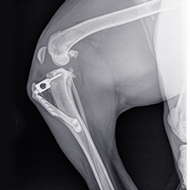Cats take in significant amounts of smoke, and even having access to the outside makes very little difference.
Exposed pets at higher risk of developing health problems
A direct link between the effects of pets living in a smoking environment and an increased risk of health problems has been discovered by the University of Glasgow.
Researchers studying the effects of smoking and the health impact it has on family pets say that animals who are exposed to smoke are at a higher risk of developing some cancers, cell damage and weight gain.
Professor Clare Knottenbelt, professor of small animal medicine and oncology at the University of Glasgow's small animal hospital, explains:
"Our findings show that exposure to smoke in the home is having a direct impact on pets. It risks ongoing cell damage, increasing eight gain after castration and has previously been shown to increase the risk of certain cancers.
"We have already shown that dogs can take in significant amounts of smoke when living in a smoking household. Our current study in cats (funded by BSAVA Petsavers) shows that cats are even more affected. This may be due to the extensive self-grooming that cats do, as this would increase the amount of smoke taken in to the body.
"As an incidental finding, we also observed that dogs living with a smoke gained more weight after neutering than those in a non-smoking household."
The researchers say that their work has shown that cats take in significant amounts of smoke, and even having access to the outside makes very little difference.
Furthermore, the study has shown that when owners reduced their intake of tobacco products to less than 10 per day, the nicotine levels found in the pet's hair fell significantly, but were still higher than those in cats from non-smoking homes.
The researchers also examined the testicles of male dogs after they were castrated and found a gene, which acts as an indicator of cell damage, was higher in dogs living in smoking homes than those in non-smoking homes.
Scientists say the finding is a 'worrying indicator' as the gene has shown to be altered in some dog cancers in other studies. The effect on this gene was reduced when owners opted to smoke outside to reduce their pet's exposure.
“We are all aware of the risks to our health of smoking and it is important we do everything we can to encourage people to stop smoking," said professor Knottenbelt.
"As well as the risk to the smoker, there is the danger of second-hand smoke to others. Pet owners often do not think about the impact that smoking could have on their pets.
"Whilst you can reduce the amount of smoke your pet is exposed to by smoking outdoors and by reducing the number of tobacco products smoked by the members of the household, stopping smoking completely is the best option for your pet’s future health and wellbeing.”
This study is ongoing and the research paper is expected to be published later this year.
Image (C) Paolo Neo







 Birmingham Dogs Home has issued an urgent winter appeal as it faces more challenges over the Christmas period.
Birmingham Dogs Home has issued an urgent winter appeal as it faces more challenges over the Christmas period.
